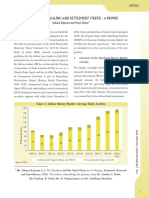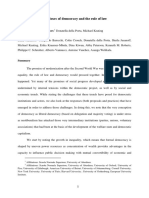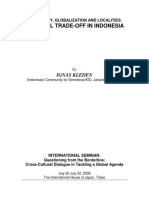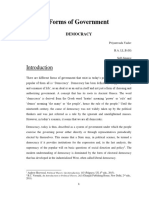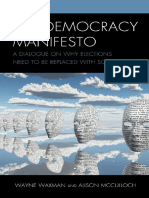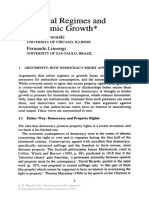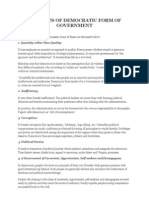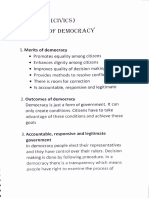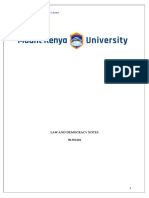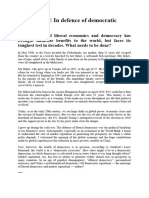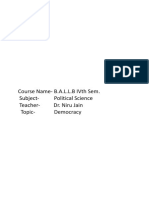0 ratings0% found this document useful (0 votes)
28 viewsPre-Conditions For Democracy
Pre-Conditions For Democracy
Uploaded by
Sadaqat DhendsaCopyright:
© All Rights Reserved
Available Formats
Download as DOCX, PDF, TXT or read online from Scribd
Pre-Conditions For Democracy
Pre-Conditions For Democracy
Uploaded by
Sadaqat Dhendsa0 ratings0% found this document useful (0 votes)
28 views3 pagesOriginal Title
Pre-Conditions for Democracy
Copyright
© © All Rights Reserved
Available Formats
DOCX, PDF, TXT or read online from Scribd
Share this document
Did you find this document useful?
Is this content inappropriate?
Copyright:
© All Rights Reserved
Available Formats
Download as DOCX, PDF, TXT or read online from Scribd
Download as docx, pdf, or txt
0 ratings0% found this document useful (0 votes)
28 views3 pagesPre-Conditions For Democracy
Pre-Conditions For Democracy
Uploaded by
Sadaqat DhendsaCopyright:
© All Rights Reserved
Available Formats
Download as DOCX, PDF, TXT or read online from Scribd
Download as docx, pdf, or txt
You are on page 1of 3
Pre-requisites for the Success of Democratic Political Systems
“Government of the people, by the people, and for the people”- Abraham Lincoln
Democracy is a form of government where the people rule over themselves in the interest
of all citizens. However, in order to be successful, democracy needs certain pre-requisites. The
following conditions are commonly regarded as necessary- or at least extremely helpful- for the
establishment and maintenance of democracy.
1. Economics and Politics
There is an inherent interdependence between politics and economics. Such
interdependence has repercussions for democracy because economic factors can
negatively affect the democratic process. In this context, the absence of economic
oligarchies is important for the success of democracy.
a. The Absence of Economic Oligarchies
Political democracy cannot thrive in those nations where ownership or
control of the economy has become concentrated in the hands of a relatively small
number of persons. A lot of dangers for democracy are inherent in the
development of larger and more powerful corporations which hold companies,
chain stores, trade associations, international cartels and many other devices, in
order to restrict competition and to narrow the opportunities of small business.
Such a situation creates a dilemma: an increasingly powerful oligarchy
and an expanding political democracy within the same society. Oligarchy and
democracy tend to clash; powerful economic interests seek to shape public policy
to promote their own purposes, while the popular majority just as naturally tries to
use its political power to improve its own economic and social status. Thus, there
arises the question of whether popular sovereignty can be a reality in a society
where an increasing number of ‘sovereign’ people lack the power to shape public
policy.
2. Property Ownership and Democracy
It would be erroneous to accept any dogma concerning the
inevitable or necessary relationship between democracy and a particular
economic system. Great Britain, the Scandinavian countries, and New
Zealand may be cited as examples of countries that, although more or less
socialist in their economic structures, are nevertheless politically
democratic. However, it seems that, generally, private property is an
essential pre-requisite for democracy.
a. Private Property is Desirable for Democracy
Private property-not necessarily unlimited-is desirable for
democracy and democracy tends to be stronger where the ownership of
property is widely and rather evenly distributed. It is also significant that
democracy appears particularly secure in those countries, such as
Switzerland, Norway, Sweden, and Denmark, which are not characterized
by great extremes of wealth and poverty. On the other hand, in Italy, India,
Pakistan and several states of the United States, such extremes have been
and still are very conspicuous, and democracy in these various political
systems has made slow and halting progress. Hence, the argument that
democracy is impossible without private property and freedom of business
enterprise is countered by the argument that political democracy and
liberty will be realities only when they are supported by economic and
social democracy- that no society can be politically democratic if there are
extreme differences in the distribution of wealth.
3. Politics and Society
In evaluating the conditions essential to successful democratic
government, it is necessary to consider some important non-economic factors,
including the characteristics of culture. These cultural traits are necessary for the
evolution of democracy in a country:
a. A Basic Understanding of Democracy
It is generally agreed that democracy cannot be transplanted successfully
among people who do not understand it and whose political leaders are
unaccustomed to the resolution of their conflicts through political compromise
and bargaining. Democracy cannot be served up intact on a platter of authoritarian
traditions. In other words, the success of democracy is dependent upon the
presence of what one writer has called the ‘democratic vision’, which inspires the
citizenry to work earnestly for the realization of democratic goals. This is closely
related to what another writer terms a ‘civic’ sense among the people- ‘a rational
like-mindedness and an imaginative sympathy that in some degree transcend
economic and cultural differences.
b. A Consensus on Fundamentals
A consensus on fundamentals is necessary to the smooth working of
democracy and that consensus is in large part a function of a relatively
homogeneous society and culture. Where there are major racial, linguistic, or
religious cleavages, there are also very likely to be political instability, a tendency
toward authoritarian politics, or both.
c. A Well-Educated Citizenry
Another generally recognized precondition for successful democracy is a
literate and reasonably well-educated citizenry. This can be achieved only by
means of ‘a system of general education, an intelligent and independent press, and
freedom of association and discussion’. While well-educated people are not
necessarily democratic, it is clear that democracy develops successfully only
where there is a high degree of literacy, a public reasonably well informed on
civic matter, and adequate and open channels of communication. Democracy
arrived in England, France and the United States than it did in Italy or Spain,
where illiteracy was widespread.
d. Vigorous Public Discussion
Moreover, if education is mainly factual and vocational, failing to
encourage independent and critical thinking about public questions, it will not
produce the civic interest and awareness on the part of the citizenry upon which
the success of the citizenry ultimately depends. An informed but indifferent public
is as dangerous as an illiterate one. It is important that vigorous public discussion
be encouraged and facilitated by means of institutional arrangements and
constitutional safeguards that assure full opportunity for association, meeting,
communication and orderly protest. Without these safeguards, even a literate and
educated citizenry cannot provide adequate protection against the abuses of an
authoritarian regime, but many become merely its pliant subjects.
You might also like
- Ict 2 Finals Exam Besa Bsa2aDocument4 pagesIct 2 Finals Exam Besa Bsa2aJoyce Ann Cortez100% (1)
- Three Paradoxes of DemocracyDocument14 pagesThree Paradoxes of DemocracyPutu Aria SingsinganNo ratings yet
- (READ) Lect 4 Why Market Capitalism Favors Democracy (Optional Reading)Document3 pages(READ) Lect 4 Why Market Capitalism Favors Democracy (Optional Reading)Cheryl LuiNo ratings yet
- (ASM403) Reflective Paper Wan Muhammad Akram Bin Wan Mohd Azli Ba2321aDocument2 pages(ASM403) Reflective Paper Wan Muhammad Akram Bin Wan Mohd Azli Ba2321aWan Muhammad AkramNo ratings yet
- Triparty Repo Dealing and Settlement (Treps) - A Primer: Sahana Rajaram and Payal GhoseDocument7 pagesTriparty Repo Dealing and Settlement (Treps) - A Primer: Sahana Rajaram and Payal GhoseArnnava SharmaNo ratings yet
- Transnational Democracy - 1999 - John DryzekDocument22 pagesTransnational Democracy - 1999 - John Dryzekjulia farah scholzNo ratings yet
- Nations Matter: Culture, History, and The Cosmopolitan DreamDocument26 pagesNations Matter: Culture, History, and The Cosmopolitan DreamelviraNo ratings yet
- Ch. 1 - Society Must Be DismantledDocument33 pagesCh. 1 - Society Must Be DismantledEleanora LawrenceNo ratings yet
- Zizek, S., El Resto Indivisible (Sobre Schelling), Godot, Bs. Ar., 2016Document126 pagesZizek, S., El Resto Indivisible (Sobre Schelling), Godot, Bs. Ar., 2016Eduardo100% (1)
- Democracy 4Document12 pagesDemocracy 4durva.juaria8No ratings yet
- Challenging Conventional WisdomDocument17 pagesChallenging Conventional WisdomIndianhoshi HoshiNo ratings yet
- Human values test intensive coachingDocument7 pagesHuman values test intensive coachingdhanushasrinivasan18No ratings yet
- Bellarmine WeAg Neg 01 - Jack Howe Memorial Invitational Round 3Document40 pagesBellarmine WeAg Neg 01 - Jack Howe Memorial Invitational Round 3EmronNo ratings yet
- Society Must Be Dismantled - BrownDocument56 pagesSociety Must Be Dismantled - BrownCarolinaMitrovNo ratings yet
- Democracy, Government Failure and CorruptionDocument48 pagesDemocracy, Government Failure and CorruptionManisita SamalNo ratings yet
- Is Education A Pre Requisite For Democracy - by Saurav MishraDocument5 pagesIs Education A Pre Requisite For Democracy - by Saurav Mishraapi-19869499No ratings yet
- Democracy'S Value: Ian Shapiro and Casiano Hacker-CordoânDocument23 pagesDemocracy'S Value: Ian Shapiro and Casiano Hacker-CordoânFirmansyahNo ratings yet
- CIVIC Education Final of The Final-1Document26 pagesCIVIC Education Final of The Final-1muhirwa SamuelNo ratings yet
- Democratic Practices: M2 Q2 TNCT 12Document52 pagesDemocratic Practices: M2 Q2 TNCT 12salaoashton857No ratings yet
- Outcome of Democracy - NotesDocument3 pagesOutcome of Democracy - NotesseraeldhoNo ratings yet
- Krasner - The Case For Shared SovereigntyDocument16 pagesKrasner - The Case For Shared SovereigntyAnna K.No ratings yet
- The Problem of Civic Competence Robert Alan DahlDocument17 pagesThe Problem of Civic Competence Robert Alan Dahljohn brehmerNo ratings yet
- DEMOCRACYDocument4 pagesDEMOCRACYSherif MohamedNo ratings yet
- Demo - Glob-Ignas KledenDocument15 pagesDemo - Glob-Ignas Kledenlubeck starlight100% (1)
- Politics & the Struggle for Democracy in Ghana: An Introduction to Political ScienceFrom EverandPolitics & the Struggle for Democracy in Ghana: An Introduction to Political ScienceNo ratings yet
- The Evolution of DemocracyDocument2 pagesThe Evolution of Democracymuskaanwork24No ratings yet
- Goal 05 DemocracyDocument8 pagesGoal 05 DemocracyAdnan NisarNo ratings yet
- Contemporary World Reflection Paper RobertDocument3 pagesContemporary World Reflection Paper Roberthaerviu hsiehNo ratings yet
- Latham Hist of ResponsDocument12 pagesLatham Hist of ResponsRobert LathamNo ratings yet
- The 2023 Legatum Prosperity Overview ReportDocument26 pagesThe 2023 Legatum Prosperity Overview ReportifaloresimeonNo ratings yet
- Outcomes of DemocracyDocument5 pagesOutcomes of DemocracydancelikeangelNo ratings yet
- Forms of Government: DemocracyDocument6 pagesForms of Government: DemocracyManvendra Pratap SinghNo ratings yet
- Fake Democracy The Limits of Public Sphere TheoryDocument8 pagesFake Democracy The Limits of Public Sphere TheoryVojta KepkaNo ratings yet
- Waxman & McCulloch - The Democracy Manifesto. A Dialogue On Why Elections Need To Be Replaced With Sortition (2022)Document199 pagesWaxman & McCulloch - The Democracy Manifesto. A Dialogue On Why Elections Need To Be Replaced With Sortition (2022)John StoufferNo ratings yet
- Theme on Democracy for CSS EssayDocument3 pagesTheme on Democracy for CSS EssayKhan balochNo ratings yet
- Topic 6 Democracy and CapitalismDocument21 pagesTopic 6 Democracy and CapitalismHani Axmed CaliNo ratings yet
- Simon Chapple Building Democratic Resilience Policy BriefDocument4 pagesSimon Chapple Building Democratic Resilience Policy BriefStuff Newsroom100% (2)
- Outcomes of DemocracyDocument14 pagesOutcomes of DemocracythinkiitNo ratings yet
- Democracy and Development Political Regimes and Economic GrowthDocument25 pagesDemocracy and Development Political Regimes and Economic GrowthXubair KhanNo ratings yet
- DP CH.7. Outcomes of DemocracyDocument8 pagesDP CH.7. Outcomes of Democracythanigeshvanthars sNo ratings yet
- 4TH EDITHA Instructured Module in TrendsDocument42 pages4TH EDITHA Instructured Module in TrendsEditha FernandezNo ratings yet
- Civics Ch5 NotesDocument5 pagesCivics Ch5 Notesmridulbajaj6fNo ratings yet
- Democracy and PovertyDocument30 pagesDemocracy and PovertyMichel Monkam MboueNo ratings yet
- Demerits of Democratic Form of GovernmentDocument3 pagesDemerits of Democratic Form of GovernmentadammathewsNo ratings yet
- Outcomes of DemocracyDocument5 pagesOutcomes of DemocracyanchitasarmaNo ratings yet
- Hoib 8Document5 pagesHoib 8tusbeeha.fatimaNo ratings yet
- 09 - Chapter 3Document20 pages09 - Chapter 3Vinay Kumar KumarNo ratings yet
- Reading 1 What Democ IsDocument16 pagesReading 1 What Democ IsCarlos QuinteroNo ratings yet
- Outcomes of Democracy Class 10Document5 pagesOutcomes of Democracy Class 10wordgames356No ratings yet
- Democratization ofDocument18 pagesDemocratization ofDEEPAK GROVERNo ratings yet
- DemocacyDocument5 pagesDemocacyMawaddah MarjanNo ratings yet
- Chapter 2 - Part 1Document16 pagesChapter 2 - Part 1Ahmed Hussien FouadNo ratings yet
- What Democracy Is. - . and Is NotDocument16 pagesWhat Democracy Is. - . and Is NotAIván SánchezNo ratings yet
- Liberal Priorities For IndiaDocument5 pagesLiberal Priorities For IndiaAung Kyaw MoeNo ratings yet
- MKU - Law and Democracy NotesDocument64 pagesMKU - Law and Democracy NotesMaurice AmaniNo ratings yet
- Dye T. Top Down PolicymakingDocument9 pagesDye T. Top Down PolicymakingMargaret WhiteNo ratings yet
- Martin WolfDocument10 pagesMartin WolfPavan KumarNo ratings yet
- What Democracy Is - . - and Is Not: Schmitter, Philippe C. Karl, Terry Lynn, 1947Document15 pagesWhat Democracy Is - . - and Is Not: Schmitter, Philippe C. Karl, Terry Lynn, 1947rodolphe13No ratings yet
- Who Will Tell The People: The Betrayal Of American DemocracyFrom EverandWho Will Tell The People: The Betrayal Of American DemocracyRating: 4 out of 5 stars4/5 (23)
- Briefing Media Good GovernanceDocument17 pagesBriefing Media Good GovernanceShamim MunirNo ratings yet
- Democracy and Illiteracy Cannot Move TogetherDocument6 pagesDemocracy and Illiteracy Cannot Move Togethergodic67% (3)
- 4 DemocracyDocument15 pages4 DemocracyPriya KushwahaNo ratings yet
- Demagogues, Populists And Their Helpers: Politics of Division, Deceit and ConflictFrom EverandDemagogues, Populists And Their Helpers: Politics of Division, Deceit and ConflictNo ratings yet
- Quantification of Waste in Conventional Construction: Siti Akhtar Mahayuddin and Wan Akmal Zahri Wan ZaharuddinDocument4 pagesQuantification of Waste in Conventional Construction: Siti Akhtar Mahayuddin and Wan Akmal Zahri Wan ZaharuddinNeven Ahmed HassanNo ratings yet
- Navratna: From Wikipedia, The Free EncyclopediaDocument5 pagesNavratna: From Wikipedia, The Free EncyclopediapradanjainNo ratings yet
- Employee VoiceDocument8 pagesEmployee Voicemyko7No ratings yet
- Long-Lived AssetsDocument4 pagesLong-Lived AssetsbluemajaNo ratings yet
- March 2016 (v2) MS - Paper 2 CIE Economics IGCSEDocument10 pagesMarch 2016 (v2) MS - Paper 2 CIE Economics IGCSEfarahNo ratings yet
- New Choice Importadora e Exportadora 5 Mawb 9 ViasDocument9 pagesNew Choice Importadora e Exportadora 5 Mawb 9 ViasAndrea CevallosNo ratings yet
- Chapter-1: Advertising BudgetDocument30 pagesChapter-1: Advertising BudgetHarman PreetNo ratings yet
- Class XiithDocument11 pagesClass XiithSantvana ChaturvediNo ratings yet
- Capabilities-Driven Strategy WorkshopDocument3 pagesCapabilities-Driven Strategy Workshopwalabu100% (1)
- DDWG 2523 Financial Accounting Ii: Chapter 1-Control AccountsDocument22 pagesDDWG 2523 Financial Accounting Ii: Chapter 1-Control AccountsAzyyati Mohamad UtamaNo ratings yet
- 2023 Employment BriefsDocument11 pages2023 Employment BriefsBernewsAdminNo ratings yet
- 02 Historical BackgroundDocument17 pages02 Historical BackgroundRohan PatilNo ratings yet
- UTS - Simulasi Negosiasi Multilateral #1Document37 pagesUTS - Simulasi Negosiasi Multilateral #1151210012No ratings yet
- Topic 5 Part 2Document22 pagesTopic 5 Part 2ericlimkj83No ratings yet
- Selling Your Own Tomato Sauce: Submitted To: Dr. Sukhmani Submitted byDocument9 pagesSelling Your Own Tomato Sauce: Submitted To: Dr. Sukhmani Submitted byRohit SainiNo ratings yet
- Invoice Mrs. Ester & Mr. AndhanngDocument1 pageInvoice Mrs. Ester & Mr. AndhanngRomi SoebrotoNo ratings yet
- Ethanol, Red Meat Trade, and Food Security: Al Mussell, PHD Sr. Research AssociateDocument21 pagesEthanol, Red Meat Trade, and Food Security: Al Mussell, PHD Sr. Research AssociateEd ZNo ratings yet
- An Analysis On The Supply Chain of RiceDocument9 pagesAn Analysis On The Supply Chain of RiceGela Roxas50% (2)
- MIS Application in Manufacturing SectorsDocument10 pagesMIS Application in Manufacturing SectorsYogesh Kadian100% (1)
- Innovation Management in Design Process: Jiří Vacek UWB, Faculty of Economics Vacekj@kip - Zcu.czDocument26 pagesInnovation Management in Design Process: Jiří Vacek UWB, Faculty of Economics Vacekj@kip - Zcu.czToulouse18No ratings yet
- Department of Business StudiesDocument2 pagesDepartment of Business Studiesfarhan israrNo ratings yet
- ReceivablesDocument5 pagesReceivablesHanns Lexter PadillaNo ratings yet
- 5040 - Assignment 1Document18 pages5040 - Assignment 1BeenishFatimaNo ratings yet
- India, Country That Occupies The Greater Part of South Asia. It Is ADocument1 pageIndia, Country That Occupies The Greater Part of South Asia. It Is AangellicaNo ratings yet
- Jobs Dated 031118Document5 pagesJobs Dated 031118api-244053115No ratings yet
- Kotak Bank Annual ReportDocument196 pagesKotak Bank Annual ReportCaCs Piyush SarupriaNo ratings yet
- First Merit List MBA IRM B.com (P.U. Category) 2018Document3 pagesFirst Merit List MBA IRM B.com (P.U. Category) 2018Huzaifa AshNo ratings yet




